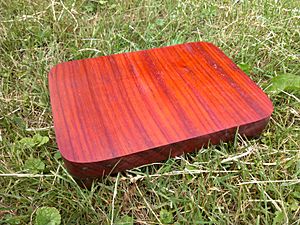African padauk facts for kids
Quick facts for kids African padauk |
|
|---|---|
| Scientific classification |
|
| Kingdom: | Plantae |
| Clade: | Tracheophytes |
| Clade: | Angiosperms |
| Clade: | Eudicots |
| Clade: | Rosids |
| Order: | Fabales |
| Family: | Fabaceae |
| Genus: | Pterocarpus |
| Species: |
P. soyauxii
|
| Binomial name | |
| Pterocarpus soyauxii Taub.
|
|
| Script error: The function "autoWithCaption" does not exist. | |
Script error: No such module "Check for conflicting parameters".

The Pterocarpus soyauxii, often called African padauk or African coralwood, is a special type of tree. It belongs to the Pterocarpus group in the Fabaceae family, which includes many plants like peas and beans. This tree naturally grows in central and tropical west Africa. You can find it from Nigeria all the way east to the Congo and south into Angola.
This tree can grow very tall, reaching heights of 27 to 34 meters (about 90 to 110 feet). Its trunk can be up to 1 meter (about 3 feet) wide. It has reddish-grey bark that often flakes off. The leaves are made up of 11 to 13 smaller leaflets. Its flowers grow in clusters called panicles. The fruit is a spiky pod that is about 6 to 9 centimeters (2.4 to 3.5 inches) long. Unlike many pods, it does not open up when it is ripe.
Contents
Amazing Uses of African Padauk
African padauk trees are very useful to people in many ways. From their leaves to their strong wood, different parts of the tree are valued.
Healthy Leaves for Eating
The leaves of the African padauk tree are safe to eat. They are full of vitamin C, which is important for staying healthy. People often eat them as a leaf vegetable, similar to spinach.
Traditional Medicine from Bark
People in Africa have used extracts from the tree's bark for a long time. These extracts are part of herbal medicine. They are used to help treat various skin problems and infections.
Valuable and Strong Wood
The wood from the African padauk tree is very special and valuable.
- It is super durable, meaning it lasts a long time.
- When first cut, the wood is a bright red color.
- Over time, when exposed to light, it changes to a purplish-brown.
- The wood is quite dense, weighing about 0.79 grams per cubic centimeter.
- It is also naturally resistant to termites, which are insects that can damage wood.
The wood is highly prized in Africa for making drums. This is because it has excellent sound qualities. Musicians also love to use this wood for stringed instruments, like acoustic and electric guitars. They value it for its great sound and how long it lasts.
However, if you work with this wood, the dust it creates can sometimes cause skin irritation for some people.
Local Names for the Tree
In different parts of Africa, this tree has many local names. Some of these names include Kisese (in Congo), Mbel (in Cameroon), Mukula and N'gula (in Zaire), and Tacula (in Angola).
See also
 In Spanish: Pterocarpus soyauxii para niños
In Spanish: Pterocarpus soyauxii para niños
 | William Lucy |
 | Charles Hayes |
 | Cleveland Robinson |

